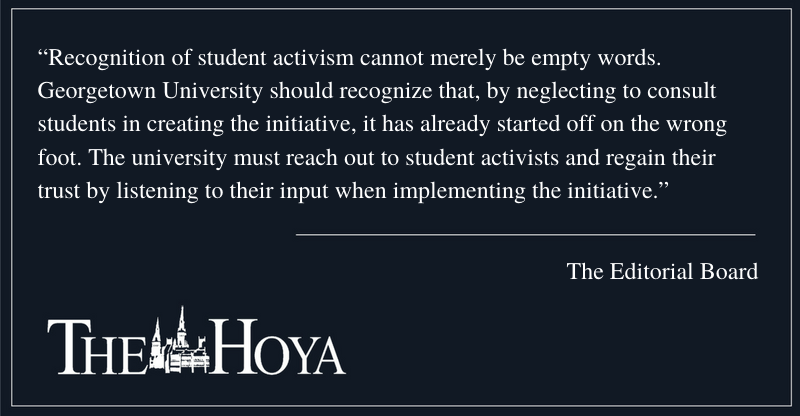Last week, Georgetown University announced an initiative to collaborate with descendant communities to support community-based projects to benefit descendants of the GU272, the 272 enslaved people sold by the Maryland Province of the Society of Jesus in 1838 to financially sustain the university. Georgetown’s new initiative marks significant progress in the university’s efforts to address its history of slavery but does not sufficiently engage with student advocates on this issue.
Georgetown’s proposed initiative comes as a result of persistent activism from descendants and students demanding university action. Students voted overwhelmingly in favor of a Georgetown University Student Association referendum to pay an additional $27.20 every semester toward a fund to benefit descendants of the GU272. 66.1% of voters supported the referendum with a turnout rate of 57.9%, the highest recorded in student government history.
Georgetown has said this initiative will involve close collaboration with student advocates and the descendant community. However, the creation of its initiative without agreement from student activists fails to sufficiently include the most prominent voices GU272 advocacy. Despite its faults, the initiative is a commendable step in recognizing this institution’s moral obligation to reconcile with its past wrongs.
“The University will ensure that the initiative has resources commensurate with, or exceeding, the amount that would have been raised annually through the student fee proposed in the Referendum, with opportunities for every member of our community to contribute,” University President John J. DeGioia (CAS ’79, GRD ’95) wrote in an Oct. 29 email. The fund from a student fee collected from the current undergraduate population would have totaled approximately $400,000 annually.
Georgetown chose to forgo the mandatory student fee to encourage broader participation, according to a university spokesperson.
“As we engaged with members of our Georgetown community and with Descendants, we learned that there is broad interest in supporting this work and in providing a mechanism that would let anyone across the University participate,” the spokesperson wrote in an email to The Hoya. “We want to create a common framework in which everyone can contribute to making this initiative successful.”
To follow through with its commitment to include broader participation, the university should advertise fundraising efforts for the initiative and continue holding events to discuss Georgetown’s history with slavery. If the university fulfills this commitment, this editorial board believes Georgetown’s initiative has greater potential than the originally proposed student fee.
Because the initiative is open to receiving contributions from everyone, it can attract more sources of funding than contributions from undergraduate students. Students who support the referendum can still contribute to this new initiative and sustain a dialogue on campus to encourage their peers to do so as well.
Moreover, the new initiative places the onus on Georgetown to raise sufficient funds, meaning students who are affected by the legacy of slavery will not be compelled to contribute to reconciliation efforts if they do not wish to do so. While all students benefit from Georgetown’s historic wrongs, implementing an entirely student-funded initiative does not adequately attribute blame to the university as an institution. By prioritizing Georgetown’s obligation, the responsibility is appropriately attributed to the university — the most responsible party of its historical wrongs.
This editorial board commends the university’s progress but nevertheless recognizes Georgetown’s failure to respect the wishes of the student body as demonstrated by the referendum. Student activists, including Students for GU272, the organization that created the referendum, are understandably critical of the university’s new plan. Students for GU272 raises legitimate concerns regarding the new initiative’s lack of provisions for transparency and accountability.
Student activists have been instrumental in creating the referendum and inspiring the new initiative, which DeGioia acknowledges in his email. Recognition of student activism cannot merely be empty words. Georgetown should recognize that, by neglecting to consult students in creating the initiative, it has already started off on the wrong foot. The university must reach out to student activists and regain their trust by listening to their input when implementing the initiative.
Georgetown’s initiative, though it fails to abide by the decision of the student referendum, is a right step forward to address its past. However, in implementing the initiative, Georgetown has an opportunity to recognize its mistake in neglecting student activists and must correct course.
The Hoya’s editorial board is composed of six students and chaired by the opinion editor. Editorials reflect only the beliefs of a majority of the board and are not representative of The Hoya or any individual member of the board.














